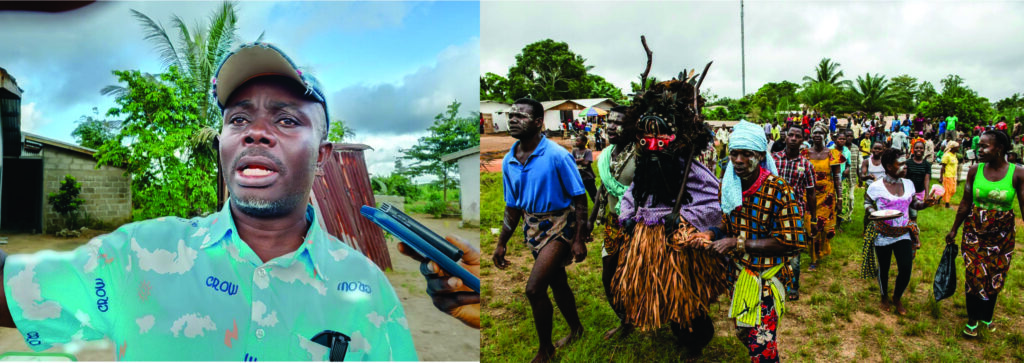In an incident of cultural conflict, Rev. Thomas S. Karnley, Jr., a pastor in Monrovia, has threatened to take legal action against a traditional figure known as the “country devil,” associated with the Poro Society in Bomi County. This event unfolded in Gangama Town when the country devil reportedly forcefully abducted three men, including a nursing student named Alex Johnson, from a healthcare facility under construction. Rev. Karnley recounted that the country devil broke into the healthcare center and took the men into the bush for initiation, which he strongly condemned. He asserted his belief that such traditional practices belong in the wilderness and should not intrude into modern life. Karnley plans to pursue legal action against the country devil, emphasizing that this act of going into town and disrupting lives for traditional rites is unacceptable.
The Poro Society is one of the male secret societies prevalent in Liberia, and it plays a crucial role in the cultural fabric of the community by preserving traditional rituals and history. Despite its significance, Rev. Karnley believes that the time has come for such practices to be confined to their traditional settings in the forests, away from urban areas. He expressed his determination to bring justice to the situation and voiced that there should be boundaries for cultural traditions, especially when they infringe upon individuals’ rights. His intervention highlights a growing concern within Liberian society regarding the tension between modernity and tradition.
In a revealing interview, Rev. Karnley detailed the traumatic experience his stewards faced, indicating the increasing pressure to reconcile tradition with current societal values. The incident raised alarm among community members, particularly within families impacted by the abduction. Mrs. Miatta Johnson, Alex’s wife, shared her distress and the harrowing experience during which her husband was taken. She recounted how the traditional entity demanded her husband be brought outside and forcibly removed him from their home, a situation intensified by the alleged violence and destruction of property. Miatta’s story further emphasizes the human cost of these traditional rites and the fear they can instill in the community.
Echoing these sentiments, Eddie Gaylor, the Town Chief, offered a contrasting view regarding the customary practices of the Poro Society. He stated his belief in honoring these traditions as part of the cultural heritage, suggesting that they carry a certain legitimacy within the community. Gaylor’s perspective illustrates a common tension between the acceptance of cultural practices and the concerns over their implications in contemporary society. While he recognized the tradition’s role, he remained unaware of the specifics of the alleged abduction, highlighting the need for greater communication and understanding among community members about the boundaries of traditional rites.
Rev. Karnley’s reaction not only brings to light the fear and conflict surrounding traditional practices in Liberia but also signifies a broader movement to challenge and redefine cultural norms. His call for legal intervention could mark a pivotal point where individuals assert their rights against what they perceive as outdated or harmful traditions. The pastor’s actions may encourage others to speak out against practices they find objectionable, potentially leading to a significant cultural shift. It raises questions about the balance between maintaining tradition and ensuring the safety and dignity of individuals within a changing society.
As this case unfolds, it poses a critical examination of how evolving societal values interact with deeply rooted cultural practices. The public and legal response to Rev. Karnley’s initiative could herald a transformation in how freedom, individual rights, and traditional practices coexist in Liberia. The situation calls for dialogues about cultural identity and the future of ancient customs, urging society to thoughtfully navigate these issues while respecting individuals’ rights to modern life free from traditional coercion. In the quest for justice, it remains to be seen how the community will respond to these pressing challenges and whether there will be significant structural changes in the practice of traditional rites.














